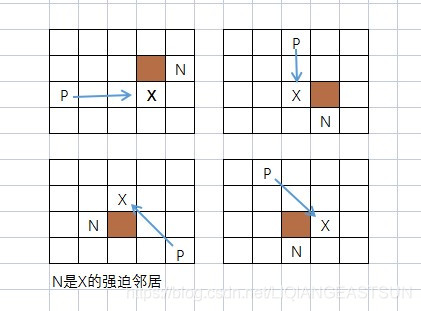1
2
3
4
5
6
7
8
9
10
11
12
13
14
15
16
17
18
19
20
21
22
23
24
25
26
27
28
29
30
31
32
33
34
35
36
37
38
39
40
41
42
43
44
45
46
47
48
49
50
51
52
53
54
55
56
57
58
59
60
61
62
63
64
65
66
67
68
69
70
71
72
73
74
75
76
77
78
79
80
81
82
83
84
85
86
87
88
89
90
91
92
93
94
95
96
97
98
99
100
101
102
103
104
105
106
107
108
109
110
111
112
113
114
115
116
117
118
119
120
121
122
123
124
125
126
127
128
129
130
131
132
133
134
135
136
137
138
139
140
141
142
143
144
145
146
147
148
149
150
151
152
153
| #include <vector>
#include <queue>
#include <cmath>
#include <limits>
#include <unordered_map>
using namespace std;
enum class Heuristic {
MANHATTAN,
EUCLIDEAN,
CHEBYSHEV
};
struct Point {
int x, y;
Point(int _x, int _y) : x(_x), y(_y) {}
bool operator==(const Point& other) const { return x == other.x && y == other.y; }
};
struct Node {
Point pos;
int g, h;
Node* parent;
Node(Point p, int g_cost, int h_cost, Node* parent_node)
: pos(p), g(g_cost), h(h_cost), parent(parent_node) {}
int f() const { return g + h; }
bool operator<(const Node& other) const {
return f() > other.f();
}
};
class JPS {
public:
JPS(vector<vector<int>>& grid) : grid(grid) {}
vector<Point> findPath(Point start, Point end, Heuristic heuristic) {
if (grid[end.x][end.y] == 1) return {};
priority_queue<Node> openList;
unordered_map<Point, Node*, PointHash> closed;
Node* startNode = new Node(start, 0, calculateHeuristic(start, end, heuristic), nullptr);
openList.push(*startNode);
while (!openList.empty()) {
Node current = openList.top();
openList.pop();
if (current.pos == end) {
return reconstructPath(current);
}
closed[Point(current.pos.x, current.pos.y)] = ¤t;
for (int dx = -1; dx <= 1; dx++) {
for (int dy = -1; dy <= 1; dy++) {
if (dx == 0 && dy == 0) continue;
Point jumpPos(current.pos.x + dx, current.pos.y + dy);
if (isValid(jumpPos) && grid[jumpPos.x][jumpPos.y] != 1) {
Point jumpResult = jump(jumpPos, dx, dy, end);
if (jumpResult != Point(-1, -1)) {
Node* neighbor = new Node(jumpResult, current.g + 1,
calculateHeuristic(jumpResult, end, heuristic), ¤t);
if (!contains(closed, neighbor->pos)) {
openList.push(*neighbor);
}
}
}
}
}
}
return {};
}
private:
vector<vector<int>> grid;
struct PointHash {
size_t operator()(const Point& p) const {
return p.x * 1000000 + p.y;
}
};
bool isValid(Point p) {
return p.x >= 0 && p.x < grid.size() && p.y >= 0 && p.y < grid[0].size();
}
Point jump(Point p, int dx, int dy, Point end) {
if (p == end) return p;
if (!isValid(p) || grid[p.x][p.y] == 1) return Point(-1, -1);
if (dx != 0 && dy != 0) {
if ((grid[p.x - dx][p.y] == 1) || (grid[p.x][p.y - dy] == 1)) {
return p;
}
}
if (dx != 0 && dy != 0) {
if ((grid[p.x - dx][p.y + dy] == 1) || (grid[p.x + dx][p.y - dy] == 1)) {
return p;
}
}
if (dx != 0 && dy == 0) {
if ((grid[p.x + dx][p.y + 1] == 1) || (grid[p.x + dx][p.y - 1] == 1)) {
return p;
}
return jump(Point(p.x + dx, p.y), dx, dy, end);
} else if (dy != 0 && dx == 0) {
if ((grid[p.x + 1][p.y + dy] == 1) || (grid[p.x - 1][p.y + dy] == 1)) {
return p;
}
return jump(Point(p.x, p.y + dy), dx, dy, end);
} else {
return jump(Point(p.x + dx, p.y + dy), dx, dy, end);
}
}
int calculateHeuristic(Point a, Point b, Heuristic h) {
int dx = abs(a.x - b.x);
int dy = abs(a.y - b.y);
switch (h) {
case Heuristic::MANHATTAN: return dx + dy;
case Heuristic::EUCLIDEAN: return static_cast<int>(sqrt(dx*dx + dy*dy));
case Heuristic::CHEBYSHEV: return max(dx, dy);
default: return 0;
}
}
vector<Point> reconstructPath(Node& node) {
vector<Point> path;
Node* current = &node;
while (current != nullptr) {
path.push_back(current->pos);
current = current->parent;
}
reverse(path.begin(), path.end());
return path;
}
bool contains(unordered_map<Point, Node*, PointHash>& map, Point key) {
return map.find(key) != map.end();
}
};
|


